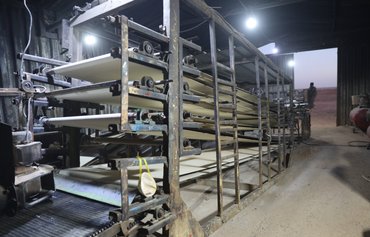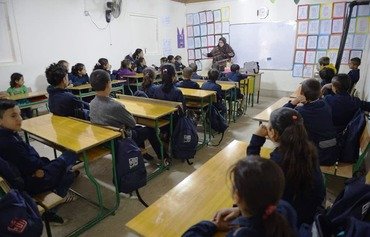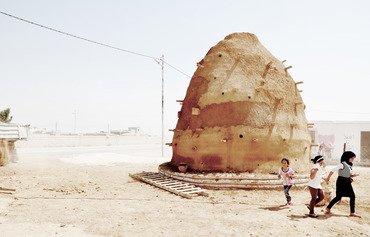A Jordanian initiative that collects and repurposes leftover bread to raise funds for education for refugees and the kingdom's poor is a recent recipient of the Mohammed Bin Rashid Award for Young Business Leaders.
Volunteers with the "Bread for Education" initiative, founded by Jordanian youth Abdul Rahman al-Zghoul, collect leftover bread from hotel kitchens, restaurants and school canteens.
The bread is dried out, turned into feed for livestock, and sold to traders across the kingdom, with the proceeds funding education opportunities for impoverished and refugee students in Jordan's public schools.
"The initiative has changed the lives of a large number of Jordanian and refugee children and families," al-Zghoul told Al-Mashareq.
"A large number of parents were unable to send their children to schools because they could not provide them with basic supplies such as school uniforms, textbooks and stationery," he said. "We were able to help many of them with the money generated from the recycling of leftover bread."
Promoting recycling
The initiative also helped promote the concept of recycling in Jordan, as well as the importance of volunteering and protecting the environment, al-Zghoul said.
A large amount of bread is discarded each day, he said, explaining that collecting and reusing it has raised funds to help thousands of students.
The initiative also helped to foster a culture of volunteerism, as teachers were trained, and in turn encouraged students to collect leftover bread.
"The initiative has helped safeguard the future of thousands of children by providing them with financial grants and assistance, and fostered solidarity among members of society," he said.
The initiative was able to allocate more than 1,000 boxes for the collection of bread, he said, stressing the importance of continued support.
In addition to benefiting children and families, the initiative has created employment opportunities for youth, and seeks to establish the first recycling centre in the Arab world to support environmental and education causes.
Social responsibility
"I trained many teachers in many schools on the importance of recycling and environment protection," said volunteer Maysar al-Nashashibi.
"We were able through the initiative to increase enrollment in school as many families were unable to send their sons and daughters to schools because they could not afford to buy textbooks, clothes or school needs," she said.
The initiative has built partnerships with community members and organisations, which contributed to its success and to increasing the number of its beneficiaries, she added.
"Such an initiative works to enhance everyone’s social responsibility, towards the environment, education and solidarity with the poor," said sociology professor Hussein al-Khuzai.
"It is important to continue to support this initiative to enable a larger number of people to benefit from it, and to expand recycling [to include] many other materials," he said.
It may be possible in the future to provide support to university students, he said, noting that the initiative has positive outcomes for society as a whole.

![Students attend a public school in Jordan. A new initiative seeks to collect leftover bread, turn it into feed for livestock and sell it, with the proceeds funding education opportunities for impoverished and refugee students in Jordan's public schools. [Photo courtesy of UNICEF]](/cnmi_am/images/2018/02/13/11368-Jordan-school-students-600_384.jpg)







Peace be upon you! Thanks for this initiative. Recycling.
Reply1 Comment(s)